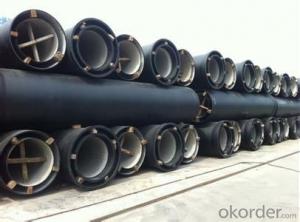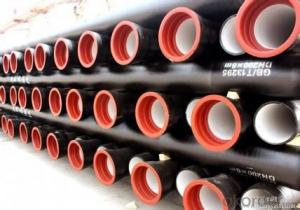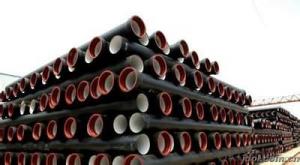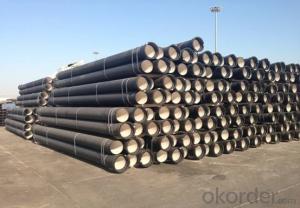DUCTILE IRON PIPE K9 DN1200
- Loading Port:
- China Main Port
- Payment Terms:
- TT OR LC
- Min Order Qty:
- -
- Supply Capability:
- -
OKorder Service Pledge
OKorder Financial Service
You Might Also Like
Ductile Iron Cast Pipe is without any defects compare with tradition casting tech, which has many advantages particularly as follow:
(1) High density. In the "vertical upward casting" process, the melt iron of centre liquid column in center crystallizer is continuously feeding for volume shrinkage caused by condensation tube at outer circumference , which lead to be free of shrinkage porosity.
(2) High purity. When melt iron pouring, the mixed impurities such as gas, dross, sand grain which are lighter than melt iron could be eliminated at furnace mouth, its impossible to enter into the crystallizer through the channel, so the melt iron into the crystallizer is very pure.
(3) Strength with toughness. The cooling speed provided by continuous crystallizer is 30 times than sand casting and 5 times than centrifugal casting, and doesn't produce white iron, the eutectic cell volume of continuous cast iron is one eighth to one tenth compare with traditional cast iron. The density of graphite nodule in ductile iron can reach 300-700 pcs/mm2. Therefore, all reason above improve the strength and toughness of continuous cast iron.
(4) Free machining. The high speed cooling make the hardening phase (such as boride, steadite) not appear like reticular, massive or thick, but diffuse like fish bone and pane in shape, moreover, there are tiny graphite flakes inlaid hardening phase. It's free machining in BrinellHardness the range of 250-300HB. However, the Brinell Hardness of 250 is top limit to common metal materials.
(5) Uniform composition of tube wall. The convection mixing of liquid column caused by marching type drawing in crystallizer make the composition of tube wall well-distributed, and concentration gradient very little.
(6) High productivity. To the wall thickness of tube under 10mm, the speed of continuous casting is 1 meter/min, to the wall thickness of tube under 20mm, the speed of continuous casting is 0.5 meter/min, which is high efficiency that centrifugal or other casting tech couldn't reach.
- Q:Can ductile iron pipes be used for high-pressure applications?
- Yes, ductile iron pipes can be used for high-pressure applications. Ductile iron has excellent strength and durability, making it suitable for handling high-pressure conditions. Additionally, ductile iron pipes have a higher pressure rating compared to other materials, making them a reliable choice for high-pressure applications.
- Q:Can ductile iron pipes be used for pressure relief systems?
- Yes, ductile iron pipes can be used for pressure relief systems. Ductile iron pipes are known for their strength, durability, and ability to withstand high pressures. They are commonly used in various applications, including pressure relief systems, where they can effectively handle and dissipate excess pressure to ensure the safety and functionality of the overall system.
- Q:Are ductile iron pipes suitable for tunneling projects?
- Yes, ductile iron pipes are suitable for tunneling projects. Ductile iron pipes are known for their strength, durability, and flexibility, making them an ideal choice for underground tunnels. They can withstand high pressure and heavy loads, making them suitable for various tunneling applications such as water and sewer systems. Ductile iron pipes also have excellent corrosion resistance, which is essential in underground environments where they may be exposed to moisture, chemicals, and other corrosive elements. Additionally, ductile iron pipes are relatively easy to install and maintain, making them a cost-effective option for tunneling projects. Overall, ductile iron pipes offer the necessary qualities required for tunneling projects, making them a suitable choice for such applications.
- Q:Why is the cast iron tube lined with cement? Under what circumstances are ductile iron pipes lined with cement, and under what circumstances do not have to be lined with cement?
- The cement lining protects the water quality, reduces the head loss and improves the service life of the spheroidal graphite pipe. As long as the water delivery hose is used, the cement lining must be used. There is no lining cement for conveying air.
- Q:What is the expected cyclic fatigue life of ductile iron pipes?
- Various factors such as material composition, pipe design, loading conditions, and environmental factors can affect the expected cyclic fatigue life of ductile iron pipes. However, ductile iron pipes are widely recognized for their exceptional ability to withstand fatigue. Ductile iron pipes are specifically engineered to endure cyclic loading, which is common in water distribution and sewer systems due to fluctuating pressures and vibrations. These pipes possess a unique microstructure that confers high strength and ductility, enabling them to resist crack formation and growth under cyclic loading. Numerous studies and industry standards have provided estimates for the expected cyclic fatigue life of ductile iron pipes. For instance, the American Water Works Association (AWWA) C151 standard recommends a design life of 100 years for ductile iron pipes used in water distribution systems, underscoring their long-term durability and resistance to fatigue. Furthermore, research studies have demonstrated that ductile iron pipes can withstand over 1 million cycles of loading without exhibiting any signs of fatigue failure. The fatigue strength of ductile iron pipes can be further augmented by employing protective coatings or linings to reduce the impact of corrosion and abrasion. Nevertheless, it is important to recognize that various factors, such as manufacturing quality, installation practices, and maintenance procedures, can influence the expected cyclic fatigue life of ductile iron pipes. Regular inspections, appropriate handling, and adherence to recommended installation guidelines can help ensure the longevity and performance of ductile iron pipes. In conclusion, while the expected cyclic fatigue life of ductile iron pipes can be subject to variation due to several factors, these pipes are generally renowned for their outstanding fatigue resistance and offer a dependable and enduring solution for water distribution and sewer systems.
- Q:The plug connection DN800 ductile iron pipe has been installed. "Shall I think so?"
- In many areas of our country, ductile iron pipe in the middle and small diameter to tube connected with the tube, the bearing type or flange interface method; ductile iron, angle limit must be allowed better seismic performance and sealing performance.
- Q:Can ductile iron pipe be used for chemical processing plant applications?
- Yes, ductile iron pipe can be used for chemical processing plant applications. Ductile iron is a type of cast iron that has enhanced properties, such as improved ductility and strength, which make it suitable for a variety of industrial applications, including chemical processing plants. Ductile iron pipes have good corrosion resistance, can withstand high temperatures and pressures, and are able to handle aggressive chemical substances. Additionally, ductile iron pipes are easy to install and maintain, making them a cost-effective choice for chemical processing plants. However, it is important to consider the specific requirements and conditions of the chemical processing plant when selecting piping materials, and consult with experts to ensure that the chosen materials are suitable for the specific chemical processes and substances involved.
- Q:Can ductile iron pipe be used for agricultural irrigation systems?
- Yes, ductile iron pipe can be used for agricultural irrigation systems. Ductile iron pipe is known for its strength, durability, and corrosion resistance, making it suitable for various applications including agricultural irrigation. It can withstand high pressure and provide a reliable and long-lasting solution for transporting water in irrigation systems. Additionally, ductile iron pipe is resistant to chemicals commonly found in water sources used for irrigation, ensuring the pipe's integrity and preventing degradation over time. Its flexibility allows for easy installation and maintenance, making it a practical choice for agricultural irrigation systems.
- Q:Can ductile iron pipes be used for underground fire protection systems?
- Yes, ductile iron pipes can be used for underground fire protection systems. Ductile iron pipes have excellent strength and durability, making them suitable for withstanding the high pressure and temperature conditions that may occur during a fire. Additionally, ductile iron pipes have a high resistance to corrosion, which is important for long-term use underground. They also provide excellent flow characteristics, ensuring that water can be quickly and efficiently delivered to extinguish fires. Overall, ductile iron pipes are a reliable and effective choice for underground fire protection systems.
- Q:Can ductile iron pipes be used for underground sewage systems?
- Yes, ductile iron pipes can be used for underground sewage systems. Ductile iron is a type of cast iron that has enhanced flexibility and strength, making it suitable for various applications, including sewage systems. Ductile iron pipes offer several advantages for underground sewage systems. Firstly, they have excellent corrosion resistance, which is crucial in sewage systems where the presence of moisture and chemicals can cause corrosion over time. This resistance to corrosion ensures the long-term durability and reliability of the pipes. Secondly, ductile iron pipes have high tensile strength, allowing them to withstand the pressure and stress that can occur in underground sewage systems. They are resistant to ground movements, such as soil settling or shifting, which can cause damage to other types of pipes. Furthermore, ductile iron pipes have a smooth internal surface, which results in a better flow capacity and reduces the likelihood of clogging or blockages in the sewage system. This smooth surface also helps to minimize the accumulation of debris and sediment, reducing the need for frequent maintenance and cleaning. Another important factor is that ductile iron pipes are available in various sizes and can easily be connected using a range of joint systems, allowing for flexibility in designing and constructing underground sewage systems. In summary, ductile iron pipes are an excellent choice for underground sewage systems due to their corrosion resistance, high tensile strength, smooth internal surface, and ease of installation.
1. Manufacturer Overview |
|
|---|---|
| Location | |
| Year Established | |
| Annual Output Value | |
| Main Markets | |
| Company Certifications | |
2. Manufacturer Certificates |
|
|---|---|
| a) Certification Name | |
| Range | |
| Reference | |
| Validity Period | |
3. Manufacturer Capability |
|
|---|---|
| a)Trade Capacity | |
| Nearest Port | |
| Export Percentage | |
| No.of Employees in Trade Department | |
| Language Spoken: | |
| b)Factory Information | |
| Factory Size: | |
| No. of Production Lines | |
| Contract Manufacturing | |
| Product Price Range | |
Send your message to us
DUCTILE IRON PIPE K9 DN1200
- Loading Port:
- China Main Port
- Payment Terms:
- TT OR LC
- Min Order Qty:
- -
- Supply Capability:
- -
OKorder Service Pledge
OKorder Financial Service
Similar products
New products
Hot products
Related keywords





























